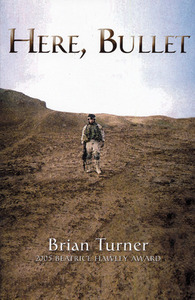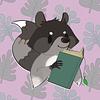Take a photo of a barcode or cover
Vivid and powerful, sometimes achingly sad. The voice in these poems is that of a young man who has been made old by what he's seen and done. This is a fitting companion volume to The Warrior by Frances Richey. Anyone who wants to understand the war in Iraq, or Afghanistan, or any other, should include this in their reading list.
A powerful book of poetry describing the savagery and tragedy of the lives wrecked by war - both those of soldiers and of their family. Not for the faint hearted.
Perhaps one day, when Brian Turner is only the first Poet to return from Iraq and be published, we will examine him in a different light.
For now, this may reamin my favorite collection of poems.
For now, this may reamin my favorite collection of poems.
Who says a soldier can't be a poet? In this one short book, Brian Turner became one of my favorite poets. His poems are visceral, emotional, sometimes violent, tangible, and above all, REAL. Personally, I think poetry is the best way to really experience a place or event through literature. That isn't true for everyone, obviously, but it is for me. Although I will never truly understand what soldiers go through, this short anthology has brought me just a little bit closer.
A few things that strike me: Brian Turner, even while he experiences the worst things war has to offer, never loses his humanity. He's caring, he's observant, he's still able to recognize the beauty of the place he is stationed, even if that beauty is soaked in violence. He never loses his ability to care for people, to love, and in fact wonders in his second to last poem if this year as a soldier has made him a lover. In another poem, "Sadiq", he says that no matter what happens to you or how angry you are, you should never enjoy killing.
Every poem in this book struck me. Many of them made me feel as if I'd lost my breath. They are absolutely fantastic. True wonders.
A few things that strike me: Brian Turner, even while he experiences the worst things war has to offer, never loses his humanity. He's caring, he's observant, he's still able to recognize the beauty of the place he is stationed, even if that beauty is soaked in violence. He never loses his ability to care for people, to love, and in fact wonders in his second to last poem if this year as a soldier has made him a lover. In another poem, "Sadiq", he says that no matter what happens to you or how angry you are, you should never enjoy killing.
Every poem in this book struck me. Many of them made me feel as if I'd lost my breath. They are absolutely fantastic. True wonders.
A haunting and powerful book. It should probably be required reading. As long as we keep fighting wars, we need books like this. Need to know how brave our soldiers are, but also how we are culpable in the deaths of thousands. It is the opposite of a political book. Turner writes about WAR and all it's ugliness but his language is taut and beautiful. Some of the poems just floored me. Highly recommended.
After earning his MFA, Brian Turner served in Iraq with the US Army for a year. He called himself an embedded poet.
Learning about the war through poetry, it is easier to understand daily life for the soldiers, and about the place where they are living away from their families. It describes parts of a place that I haven't seen before. I don't think I ever got a real picture of what Iraq looks like, even though I've seen it on the news. These poems paint a picture that includes, smells, weather.
Many of the poems are heartbreaking. Most are related to war, but not all of them. I like that Turner includes poems written about landscapes, and dreams too. There is a series of dream poems "Dreams from the Malaria Pills" which are interesting and disturbing. Also, I didn't know that malaria pills gave people weird dreams.
I am interested in seeing what Turner writes about for his next book.
My favorite poems in this book:
Sadiq - I love the ending of this poem: "it should break your heart to kill."
Jameel - This poem has a great description of cowbirds, bees.
Milh - A gorgeous poem about salt production.
Here Bullet - I love the ending: "here is where the world ends every time."
From the Fishouse (my favorite poetry website) has a good Brian Turner page.
Learning about the war through poetry, it is easier to understand daily life for the soldiers, and about the place where they are living away from their families. It describes parts of a place that I haven't seen before. I don't think I ever got a real picture of what Iraq looks like, even though I've seen it on the news. These poems paint a picture that includes, smells, weather.
Many of the poems are heartbreaking. Most are related to war, but not all of them. I like that Turner includes poems written about landscapes, and dreams too. There is a series of dream poems "Dreams from the Malaria Pills" which are interesting and disturbing. Also, I didn't know that malaria pills gave people weird dreams.
I am interested in seeing what Turner writes about for his next book.
My favorite poems in this book:
Sadiq - I love the ending of this poem: "it should break your heart to kill."
Jameel - This poem has a great description of cowbirds, bees.
Milh - A gorgeous poem about salt production.
Here Bullet - I love the ending: "here is where the world ends every time."
From the Fishouse (my favorite poetry website) has a good Brian Turner page.
Evocative, haunting, and poignant. Love, love, love these poems and the way Turner renders his memories of Iraq.
Still reading, but this is so hard. So much suffering — for what?
I did not get back to my Hoopla borrow in time to finish, but what I read will stick with me. Powerful words.
I did not get back to my Hoopla borrow in time to finish, but what I read will stick with me. Powerful words.
A very powerful collection. Turner knows how to press his poems into diamonds. Is war the only thing that can give him meaning?
To be honest I'd expected a book that drew praise because it came from the warfront and not from the perceived old boy network of academics. This book is much better than that, many of the pages transport the reader into Balad, Mosul and many of the forward bases in Iraq. I think the best compliment you can give to poetry about a real event is that it held up a mirror to the experience and let the reader taste the events in Iraq. Here, Bullet did that and not just about facing danger, but the care providers, the families and girlfriends, loneliness and the suicide epidemic.
Much of this brought back memories.
From Ashbah, 'The ghosts of American soldiers
wander the streets of Balad by night
. . .
the desert wind blowing trash
down the narrow alleys as a voice
sounds from the minaret'
Whether Turner is speaking of the dead exhaustion of multiple missions or that the ghosts of the departed still linger, both realities are true and Turner allows the both a presence without interpreting for the reader.
In R&R he paints a convincing picture of the Soldier as much more than the robotic symbol of foreign policy, one who has the life of a lover, of family, of mission all fighting for space in the same mind.
'I have a lover with hair that falls
like autumn leaves on my skin.
Water that rolls in smooth and cool
as anesthesia. Birds that carry
all my bullets into the barrel of the sun.'
If there is a complaint, and it's not much of one, each poem is buried in the psyche of one Soldier. The poems are deeply confessional. There's another side of the words from loved ones, the commo between Soldiers that is hinted at but it makes me feel that something personal to the poet is held at arm's length. Again, it's minor because most writers cannot get the feeling of one set of emotions as deeply as this one does in '2000 pounds' showing how a bomb blast alters everyone.
One of the best poems at showing these lingering effects comes toward the end in 'Night in Blue.'
'I have only the shadows under the leaves
to take with me, the quiet of the desert,
the low fog of Balad, orange groves
. . . .
I have a woman crying in my car
late at night when the stars go dim,
moonlight and sand as a resonance
of the dust of bones, and nothing more.'
Worth every penny and the time it takes to read it over and over.
Much of this brought back memories.
From Ashbah, 'The ghosts of American soldiers
wander the streets of Balad by night
. . .
the desert wind blowing trash
down the narrow alleys as a voice
sounds from the minaret'
Whether Turner is speaking of the dead exhaustion of multiple missions or that the ghosts of the departed still linger, both realities are true and Turner allows the both a presence without interpreting for the reader.
In R&R he paints a convincing picture of the Soldier as much more than the robotic symbol of foreign policy, one who has the life of a lover, of family, of mission all fighting for space in the same mind.
'I have a lover with hair that falls
like autumn leaves on my skin.
Water that rolls in smooth and cool
as anesthesia. Birds that carry
all my bullets into the barrel of the sun.'
If there is a complaint, and it's not much of one, each poem is buried in the psyche of one Soldier. The poems are deeply confessional. There's another side of the words from loved ones, the commo between Soldiers that is hinted at but it makes me feel that something personal to the poet is held at arm's length. Again, it's minor because most writers cannot get the feeling of one set of emotions as deeply as this one does in '2000 pounds' showing how a bomb blast alters everyone.
One of the best poems at showing these lingering effects comes toward the end in 'Night in Blue.'
'I have only the shadows under the leaves
to take with me, the quiet of the desert,
the low fog of Balad, orange groves
. . . .
I have a woman crying in my car
late at night when the stars go dim,
moonlight and sand as a resonance
of the dust of bones, and nothing more.'
Worth every penny and the time it takes to read it over and over.







